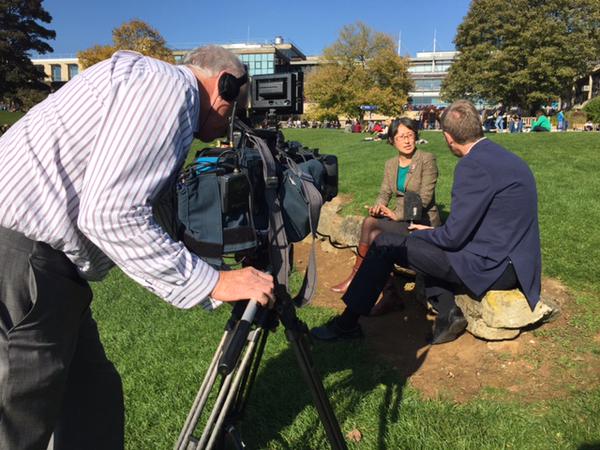Last month PhD student Heather Wyman-Pain from the Department of Electronic & Electrical Engineering gave an interview to the BBC about the nuclear power station at Hinkley. Below she discusses her experience of dealing with the media and how she would prepare in future:
I have never had any experience of talking with reporters and felt a bit out of my depth at the idea of an interview, but decided to take a step into the unknown and agreed to do it.
Professor Furong and I were sent a few questions on Friday and our interview was scheduled for the following Monday afternoon, giving us the weekend to prepare, which neither of us used to our advantage. Our key message to anyone considering being interviewed by a reporter is:
Prepare, prepare, prepare!
Monday morning arrived and we sat together in my supervisor’s office discussing the sample questions, separating them between us to prepare answers, and agreeing we would meet again for lunch. I am very happy to say we did identify the key points we wanted to make for each answer, but we didn’t leave ourselves any time to find information to back up our arguments. If we have this opportunity again we know we need to spend far longer learning the background information. We walked into this interview with that morning’s attempt at scripted replies and no idea of what to expect. Our future preparation list is:
- What are the key points and the evidence to back them up?
- Who is going to see this?
- Who is the interviewer?
- Ask for more time to prepare – If they don’t let you, you can say no
- Practice – preferably with someone who has plenty of experience with reporters
As we saw the camera by the lake the panic set in and both of us reacted in different ways. The automatic response to run away clearly showed for my supervisor and she was unhappy with every take. The reporter was very patient with this, obviously practised with interviewing people with no TV experience, and we are very thankful to him. My reaction to the cameras was the complete opposite and I have never been more grateful for the speech training my parents put me through when I was a child. I went into autopilot and have no memory of the interview, except for being told ‘We need your answer to the first question again, a duck interrupted you’.
I am happy to report that overall it went well, even with the ducks wanting to take part, and is a brilliant experience for any researcher.
Read the BBC article about Hinkley Point featuring Heather's comments.

Respond